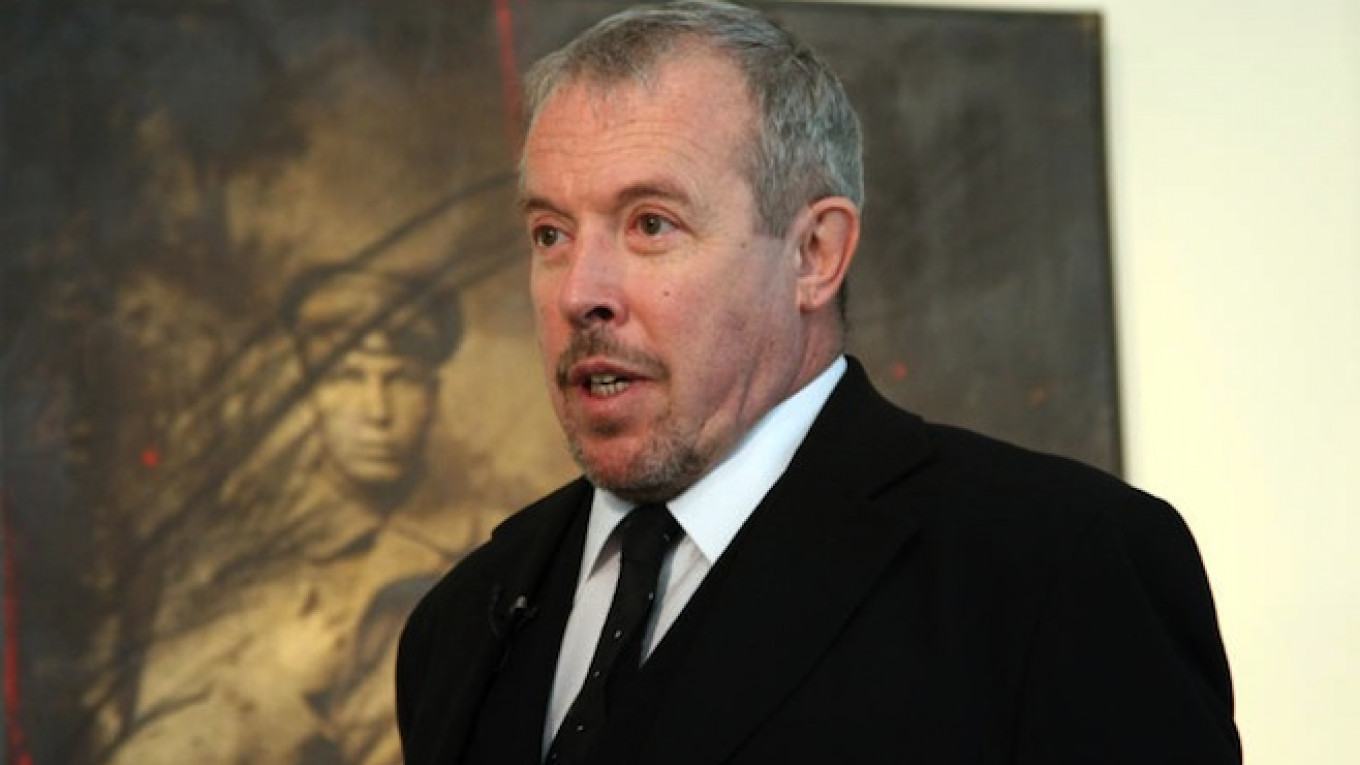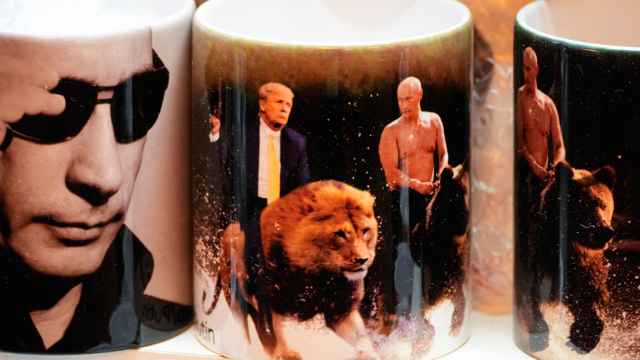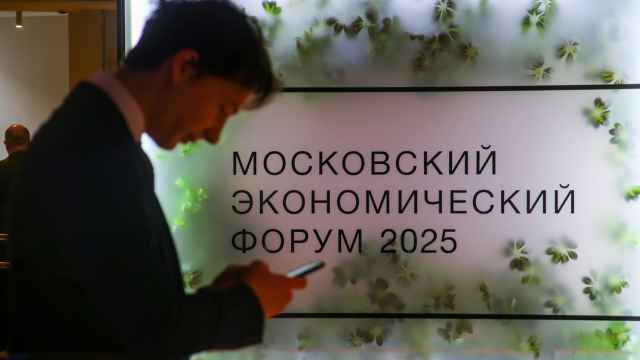Convincing millions of Russians to trade in their love of a local rock legend for hatred may be a difficult task, but now that artist Andrei Makarevich has criticized Moscow's policies in Ukraine, state-run television seems to be taking its best shot at doing just that.
Lawmakers have already called for Makarevich — the founder and lead singer of rock band Mashina Vremeny (Time Machine) — to be stripped of his state honors. To add to his worries, he has recently become the target of a disparaging program that the state-run NTV network aired during prime-time hours on Sunday.
Presented as a documentary and titled "13 Friends of the Junta" — the last word being a reference to the Kiev government — the program singled out Russian artists and other activists who have attended anti-war rallies or otherwise spoken out against Moscow's annexation of Crimea and its policies in Ukraine.
The program begins with Makarevich, one of Russia's most famous rockers, and proceeds to devote seven of its 30 minutes of airtime to analyzing his perceived devotion to Ukraine. This was the program's single longest segment.
During the segment, footage of Makarevich's recent concert in Ukraine's Svyatohirsk was merged with images of the fighting that he supposedly endorsed. The program never mentions that the concert was for the benefit of Ukraine's internally displaced children.
Speakers on the program refer to the musician as a "traitor" and a supporter of "fascists." An off-screen narrator accuses him of having financial interests in criticizing Russia's policies — an allegation that is supported by the narrator saying that "there are those" who have discovered "some information" in favor of the charge, and by footage of U.S. dollar bills rolling off a currency-production line.
The broadcast follows on the heels of calls made by Russian lawmakers this month to strip Makarevich of his state awards, including the order for distinguished service to the fatherland conferred for his achievements in music, and to exile him from the country.
To put the assaults in context, they would be akin to a hypothetical scenario of the BBC calling former Beatle Sir Paul McCartney a "traitor" and a friend of "terrorists" for speaking out against the war in Iraq and giving a charity performance to benefit displaced children, and British members of parliament urging Queen Elizabeth II to strip him of an Order of the British Empire.
But according to the program's description on the NTV website, the production is intended to inform Russians about the help provided by Makarevich and other activists to the Ukrainian "junta" in support of its bid to "continue the executioner operations in the southeast" of Ukraine.
The broadcast appeared to be the final straw for the rocker, who published an open letter to President Vladimir Putin on Monday, asking him to put an end to the onslaught of "dirt and libel that is being poured on me from the pages of newspapers and from television screens."
"The only 'crime' that I have committed is having given a charity performance in Svyatohirsk, in a camp for refugees from Donetsk and Luhansk, by singing three songs for the children of those refugees," Makarevich wrote. "For that, I feel no guilt."
His rock band Mashina Vremeny has been active for 45 years and, "in those years, has acquired millions of fans in Russia and in the world," Makarevich wrote. "One thing that we cannot in any way be accused of is a lack of love for the motherland."
But the NTV program sought to cast doubt on Makarevich's popularity, as well as his personal qualities.
It opens with the concert in Ukraine, with an off-screen narrator eagerly intoning: "A single performer is singing something in a low voice on the stage, but only the first rows are listening. The others are cheerfully and loudly chatting about unrelated topics."
The program's footage cuts from a concert hall where Makarevich was performing to an outdoor gathering under leafy trees to provide images of the cheerful chatting. Though the time and location of the second set of shots is not specified, it appears to resemble the footage shown later in the program of fans awaiting Makarevich's arrival on a lawn.
"At this precise moment, during Makarevich's opening chords, the Ukrainian army began an intensive shelling of towns in the southeast," the narrator says to the footage of artillery gun fire and supposed civilian casualties. "And 60 kilometers away, executioners were applauding their idol."
The program also claims that Makarevich opposed the annexation of Crimea because he is said to own some vineyards on the peninsula, but omits any evidence or sources, and fails to explain why a grasping Russian owner of Crimean real estate would object to the region becoming part of his country.
A speaker featured in the program, pro-Kremlin political analyst Mikhail Delyagin, accused Makarevich of "licking the fillet" of Ukraine's new government.
"No matter what beautiful words Mr. Makarevich speaks, by performing in front of Nazis who are killing people and by swearing his allegiance to them, he went over to the other side of good and evil," Delyagin says.
Putin's spokesman, Dmitry Peskov, publicly responded to the letter, saying in comments carried by the Moskovsky Komsomolets newspaper that “what he [Makarevich] sees as a smear campaign can also be viewed as the public's reaction."
"It's hardly a cause for appealing to the president,” he said, adding that aides “haven't reported” to Putin about Makarevich's letter yet.
The program also targeted poet Dmitry Bykov, satirist Viktor Shenderovich, singer Diana Arbenina, lawmaker Ilya Ponomaryov and other public figures.
One of Arbenina's faults, according to the program, is the U.S.-citizen status supposedly held by her two children and their father.
Delyagin, the critic featured in the program, said "there are people who have convictions, and there are people who have a purse."
With that, Makarevich and the others might agree.
See also:
A Message from The Moscow Times:
Dear readers,
We are facing unprecedented challenges. Russia's Prosecutor General's Office has designated The Moscow Times as an "undesirable" organization, criminalizing our work and putting our staff at risk of prosecution. This follows our earlier unjust labeling as a "foreign agent."
These actions are direct attempts to silence independent journalism in Russia. The authorities claim our work "discredits the decisions of the Russian leadership." We see things differently: we strive to provide accurate, unbiased reporting on Russia.
We, the journalists of The Moscow Times, refuse to be silenced. But to continue our work, we need your help.
Your support, no matter how small, makes a world of difference. If you can, please support us monthly starting from just $2. It's quick to set up, and every contribution makes a significant impact.
By supporting The Moscow Times, you're defending open, independent journalism in the face of repression. Thank you for standing with us.
Remind me later.






